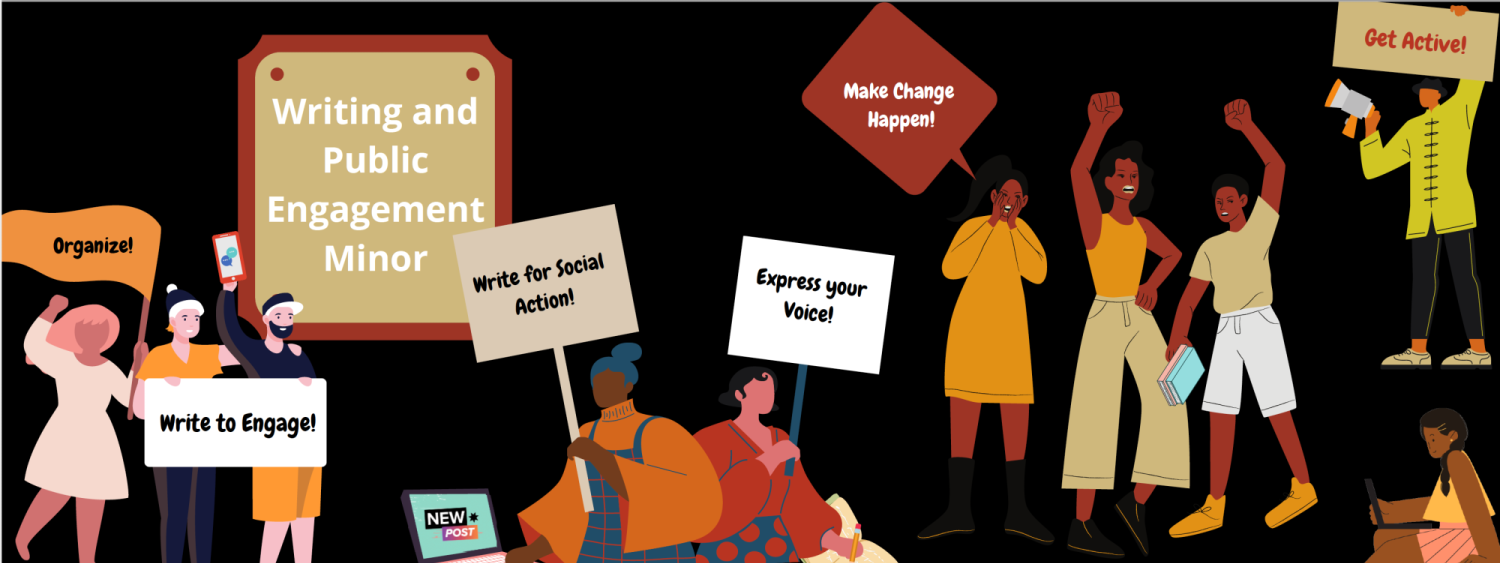Writing and Public Engagement (WPE) Minor

The WPE minor is designed to help students hone the rhetorical arts of persuasive writing and public engagement. Through a variety of courses offered through PWR and English, students will find opportunities to write in diverse genres for diverse purposes and public audiences; leverage a wide variety of digital technologies to design, produce, and distribute multimodal compositions; write in professional settings and with community partners; and write collaboratively for social change. From forwarding public arguments to designing social media content to composing for non‐profits, this minor will enable students to learn valuable skills, practices, and tools for creating, participating, and connecting as active technocitizens in the 21st century.
Contact Laurie Gries at legries@colorado.edu for more information about this minor.
- Earn 18 credits in ENGL and WRTG courses with grades of C- or better. At least 12 credits must be in upper division, and at least 9 credits must be ENGL designated courses.
- Students may apply no more than 9 credit hours of transfer work, including no more than 6 upper division credit hours, towards a minor. This is a college residency rule for an 18 credit minor.
- Students may apply one lower or upper division Creative Writing or Literature ENGL course of their choice to count towards the minor for Writing and Public Engagement. A list of recommended courses is offered below.
- Students must maintain at least a 2.00 (C) GPA in all courses counting toward the WPE minor.
- All courses for the Writing and Public Engagement minor must be in English and PWR.
- English majors (Creative Writing or Literature and Cultural Studies) are not eligible to declare an English minor.
The WPE Minor curriculum has been specifically designed to give students experience with theories, practices and actions important to writing and public engagement. In simplest terms, theory courses for the WPE curriculum introduce students to theories that are central to writing and public engagement in the 21st century. Practice courses offer students opportunities to practice writing in public facing genres from a theoretically informed position and for an imagined public audience. Action courses offer students opportunities to not only write in public facing genres but distribute their or others writing to specific public audiences with specific rhetorical goals in mind. The main idea behind this curriculum can be summed up in this simple, albeit reductive, equation: theory + practice = constructive action.
To complete the Writing and Public Engagement Minor, all students must:
Complete the following Prerequisite for Minor:
- Meet the 3 credit lower division Written Communication Requirement as required by all schools and colleges at CU Boulder.
- Complete 9 required credits in the following way: (NOTE: When registering, please look for WPE designation for the topic courses listed above to make sure they count for the minor. You can also find a list of courses that count toward the minor each semester listed below.)
THEORY: 3 CREDITS (Choose one of the following courses)
- WRTG 2000: Information and Society
- WRTG 2095: Ideas for Social Change
- WRTG 3010: Technology, Rhetoric and the Self
- WRTG 4000: Advanced Seminar in Cultural Rhetorics
- ENGL 3347: Asian American Literature
- ENGL 3377: Literatures of Race, Multiculturalism, Ethnicity
PRACTICE: 3 CREDITS (Choose one of the following courses)
- WRTG 2020 Introduction to Creative Nonfiction
- WRTG 3020: Topics in Writing (Multiple Topics to Choose from in a Given Semester)
- WRTG 3045: Writing for Emerging Workplaces
- WRTG 3070 Advocating with Data
- WRTG 4010: Critical Practices of Making & the Public Humanities
- ENGL 3016: Writing in the Age of AI
- ENGL 3026: Syntax, Citation, Analysis
- ENGL 3830: Topics in Advanced Writing and Research
ACTION: 3 CREDITS (Choose one of the following courses)
- WRTG 2090: Electives in Writing: Writing Center Theory and Praxis
- WRTG 2930: Internship in Writing and Rhetoric
- WRTG 3035: Technical Communication and Design
- WRTG 3090: Open Topics in Writing (Advanced)
- WRTG 3095:Journal Publishing
- WRTG 3930: Internship in Writing and Rhetoric
- WRTG 4020: Community Writing for Justice
- WRTG 4025: Writing for Sustainable Communities
- ENGL 3940: Service Learning Practicum
- ENGL 4116: Advanced Topics in Media Studies
- ENGL 4206: Writing for the Real World
- ENG 4717: Native American and Indigenous Studies---Capstone Seminar
3. Complete 9 credits in minor electives in one of the following ways:
- Choose 9 credits from any of the courses listed above not being used to fill the Theory, Practice, or Action requirements.
- Choose 6 credits from any of the courses listed above not being used to fill the Theory, Practice, or Action requirements and 3 credits of any other ENGL courses (see recommended courses below.)
- ENGL 1800: American Ethnic Literatures
- ENGL 2036: Introduction to Media Studies in the Humanities
- ENGL 2046: Future Histories of Technologies
- ENGL 2707: Introduction to Queer Literature
- ENGL 2717: American Indian Literature
- ENGL 2727: Introduction to African American Literature
- ENGL 2747: Introduction to Chicana/o/x Literature
- ENGL 2767: Race, Empire, and the Postcolonial
- ENGL 3005: Literature of New World Encounters
- ENGL 3006: Digital Editions & Web Publishing
- ENGL 3106: Introduction to Literary Study with Data Science
- ENGL 3026: Syntax, Citation, and Analysis: Writing About Literature (recommended prerequisite: completion of lower-division writing requirement.)
- ENGL 3246: Topics in Popular Culture
- ENGL 3031: Studies in Creative Writing for Nonmajors (prerequisite: ENGL 1191: Introduction to Creative Writing)
- ENGL 3767: Feminist Fictions
- ENGL 3796: Queer Theory
- ENGL 4018: Literature and Globalization
- ENGL 4106: Literary Study with Data Science (recommended prerequisite: ENGL 3106)
To receive additional information on the WPE minor, please fill out the survey below:



